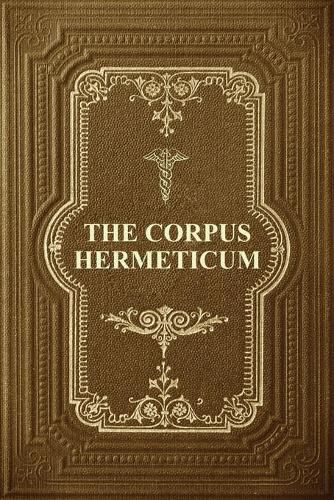Readings Newsletter
Become a Readings Member to make your shopping experience even easier.
Sign in or sign up for free!
You’re not far away from qualifying for FREE standard shipping within Australia
You’ve qualified for FREE standard shipping within Australia
The cart is loading…






This title is printed to order. This book may have been self-published. If so, we cannot guarantee the quality of the content. In the main most books will have gone through the editing process however some may not. We therefore suggest that you be aware of this before ordering this book. If in doubt check either the author or publisher’s details as we are unable to accept any returns unless they are faulty. Please contact us if you have any questions.
The fifteen tractates of the Corpus Hermeticum, along with the Perfect Sermon or Asclepius, are the foundation documents of the Hermetic tradition. Written by unknown authors in Egypt sometime before the end of the third century C.E., they were part of a once substantial literature attributed to the mythic figure of Hermes Trismegistus, a Hellenistic fusion of the Greek god Hermes and the Egyptian god Thoth.
The treatises we now call the Corpus Hermeticum were collected into a single volume in Byzantine times, and a copy of this volume survived to come into the hands of Lorenzo de Medici's agents in the fifteenth century.
The treatises divide up into several groups. The first (CH I), the "Poemandres", is the account of a revelation given to Hermes Trismegistus by the being Poemandres or "Man-Shepherd", an expression of the universal Mind. The next eight (CH II-IX), the "General Sermons", are short dialogues or lectures discussing various basic points of Hermetic philosophy. There follows the "Key" (CH X), a summary of the General Sermons, and after this a set of four tractates - "Mind unto Hermes", "About the Common Mind", "The Secret Sermon on the Mountain", and the "Letter of Hermes to Asclepius" (CH XI-XIV) - touching on the more mystical aspects of Hermeticism. The collection is rounded off by the "Definitions of Asclepius unto King Ammon" (CH XV), which may be composed of three fragments of longer works.
$9.00 standard shipping within Australia
FREE standard shipping within Australia for orders over $100.00
Express & International shipping calculated at checkout
This title is printed to order. This book may have been self-published. If so, we cannot guarantee the quality of the content. In the main most books will have gone through the editing process however some may not. We therefore suggest that you be aware of this before ordering this book. If in doubt check either the author or publisher’s details as we are unable to accept any returns unless they are faulty. Please contact us if you have any questions.
The fifteen tractates of the Corpus Hermeticum, along with the Perfect Sermon or Asclepius, are the foundation documents of the Hermetic tradition. Written by unknown authors in Egypt sometime before the end of the third century C.E., they were part of a once substantial literature attributed to the mythic figure of Hermes Trismegistus, a Hellenistic fusion of the Greek god Hermes and the Egyptian god Thoth.
The treatises we now call the Corpus Hermeticum were collected into a single volume in Byzantine times, and a copy of this volume survived to come into the hands of Lorenzo de Medici's agents in the fifteenth century.
The treatises divide up into several groups. The first (CH I), the "Poemandres", is the account of a revelation given to Hermes Trismegistus by the being Poemandres or "Man-Shepherd", an expression of the universal Mind. The next eight (CH II-IX), the "General Sermons", are short dialogues or lectures discussing various basic points of Hermetic philosophy. There follows the "Key" (CH X), a summary of the General Sermons, and after this a set of four tractates - "Mind unto Hermes", "About the Common Mind", "The Secret Sermon on the Mountain", and the "Letter of Hermes to Asclepius" (CH XI-XIV) - touching on the more mystical aspects of Hermeticism. The collection is rounded off by the "Definitions of Asclepius unto King Ammon" (CH XV), which may be composed of three fragments of longer works.